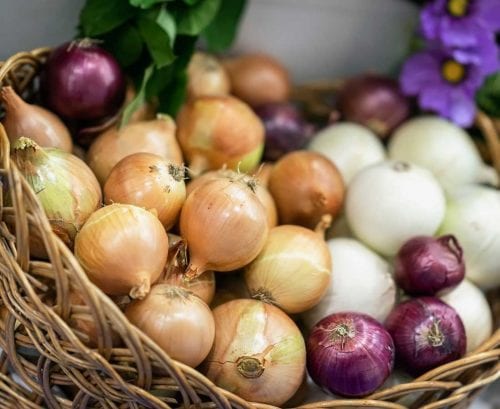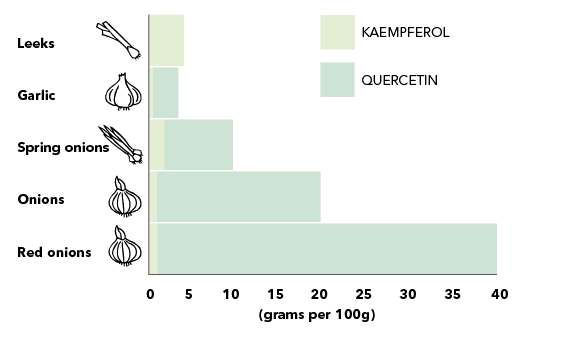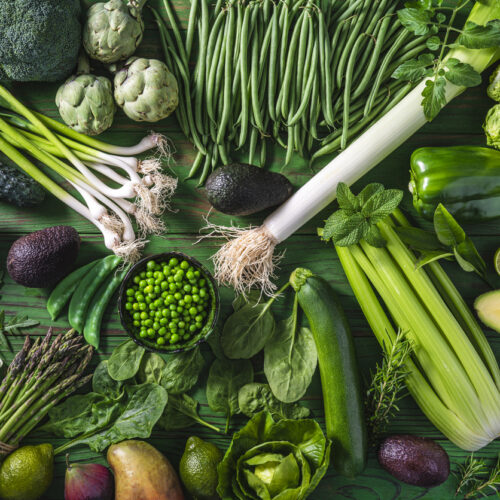
Alliums is the term used to describe vegetables in the onion family. These flavourful, pungent veg are considered key elements in a healthy diet. They add lots of flavour to our diet and are packed with naturally occurring plant chemicals that feed the gut, help keep the heart healthy and regulate blood sugar…
Allergy minimisers
Onions are a very good source of quercetin which, among other things, helps prevent histamine being released from cells. Because of this, they may have a role in protecting against allergies. This is particularly important as allergies are increasingly being seen in older people, probably due to lower immunity and cell ageing.
Cancer deterrents
Alliums are rich in sulphur-containing compounds which, when crushed, are transformed into new compounds such as allicin (in garlic). These give them their familiar flavour and odour, and may help protect against cancer – particularly cancer of the digestive tract (such as the stomach and bowel).
Blood sugar controllers
Garlic and onions may help to lower blood sugar levels, making them beneficial for those with insulin resistance or type 2 diabetes. In one study of patients with type 2 diabetes, a 100g serving of red onion significantly reduced blood sugar levels.
Promoters of a healthy gut
Onions, garlic and leeks are prebiotics. Rich in undigestible fibre, they provide food for friendly probiotic bacteria in the large intestine. Prebiotics enable the good bacteria to grow, flourish and crowd out bad bacteria, which helps to keep the digestive system working well.
Memory aids
Alliums may help with memory – spring onions, for example, contain good levels of memory-boosting nutrients such as folate and lutein. It’s worth noting that leeks contain five times more folate than onions – and good intakes of folate may help to protect us from Alzheimer’s disease.
Inflammation fighters
Inflammation is thought to be at the root of many long-term health problems, including heart disease, type 2 diabetes, Alzheimer’s disease, rheumatoid arthritis and inflammatory bowel diseases. The flavonoid quercetin, found particularly in onions, has been shown in many lab-based studies to help reduce inflammation – in particular, it may inhibit the enzymes that generate prostaglandins, which can cause inflammation and pain.
Meet the superstars of the onion world…
These allium varieties are all popular and readily available – good news, as you should aim to eat at least one 70g serving of alliums every day.
Spring onions contain 62 times more skin-friendly vitamin A than regular onions.
Health benefits of red onions
Red onions are a great source of heart-healthy and cancer-fighting quercetin.
Onions contain sulphur compounds, which are beneficial for healthy skin.
Health benefits of spring onions
Leeks contain good levels of the flavonoid kaemperfol, which acts as an antioxidant.
Garlic lowers blood pressure and cholesterol levels. For optimum benefits, finely chop or crush garlic to release its sulphur compounds.
Give your heart a helping hand
Research shows that regularly eating alliums is linked to a lower risk of cardiovascular disease.
In one study, those who ate at least one serving of onions a week were 22 per cent less likely to suffer a heart attack than those who ate no onions.
Alliums are packed with sulphur compounds as well as flavonoids such as kaempferol and quercetin (the most abundant flavonoid in alliums), which act as antioxidants.
However, the exact amounts of flavonoids they contain do vary – see how the superstars compare below:

Want more? Discover the benefits of coffee, pulses and beetroot.
Article sources and references
- Rubatzky V.E., Yamaguchi M. (1997) Alliums. In: World Vegetables. Springer, Boston, MA. https://doi.org/10.1007/978-1-4615-6015-9_17https://link.springer.com/chapter/10.1007/978-1-4615-6015-9_17
- Qianyi Wan,, et al. Allium vegetable consumption and health: An umbrella review of meta‐analyses of multiple health outcomes. Food Sci Nutr. 2019 Aug; 7(8): 2451–2470. Published online 2019 Jul 10. doi: 10.1002/fsn3.1117https://www.ncbi.nlm.nih.gov/pmc/articles/PMC6694434/
www.healthyfood.com













